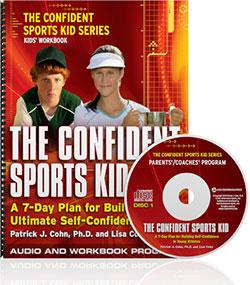
What is Choking?
Choking is what happens when an athlete performs poorly because of their inability to deal with pressure. Choking happens at all levels in sports from junior to professional athletes. This article will illustrate some situations when choking happens and suggest some solutions that parents can offer kids when under pressure.
Every athlete experiences pressure differently. Some athletes thrive on pressure whereas others break down, or choke, under pressure. It is, first of all, important for the kid to identify the situations which create the most anxiety.
Some athletes who have a big lead over an opponent, struggle with confidence. This is a comfort zone issue. Athletes can question whether they should be winning the game or match altogether. Internal dialogue like, “I am playing beyond what I am capable of,” or “I shouldn’t be beating this player, he is better than me,” or “I will start to play poorly as I have never been in this position before,” will typically keep kids stuck in a comfort zone. Being stuck in a comfort zone causes the athlete to choke and perform poorly.
Many athletes fear embarrassment by blowing a big lead, so in a way their fear of choking causes them to choke. Their reputations as fierce competitors may be on the line. Often their social circle includes other members of the sport, and they fear humiliation in front of peers and friends. If your young athlete is involved in a team sport, they can be very worried about disappointing their team members. All of these concerns act as a distraction for the athlete from focusing on their game.
Parents don’t want to see their young athletes choke in sports. It is hard to watch a skilled player crumble under pressure and blow a huge lead. How can young athletes perform their best in crunch time, and how can parents help their kids during difficult times of pressure?
Strategies for helping your kids through crunch-time
- Kids should use positive self-talk to see themselves as a winner.
If kids have low self-confidence just at the time they need it most, they should evaluate the beliefs and thoughts that they bring into competition. For example, if I label myself as a poor closer or crunch time “choker,” I will most certainly live up to these labels and not perform up to my ability in crunch time. It is important for kids to use positive self-talk such as “I excel at crunch time,” or “I will close this set out with ease”. Parents should encourage kids to write down these negative labels and replace them with positive self-talk.
2. Kids should focus on the process.
Some athletes, when they enter crunch time, get distracted by thoughts such as “If I don’t win this point, we won’t go on to the championship” or “I really need to play perfectly to win.” These thoughts do not help young athletes perform successfully. It is important for kids to stay focused on the cues that help them execute. Kids should focus on the thoughts or targets that are relevant to executing the task successfully. A tennis player may think about where he wants to place the ball in the receivers serve box, for example. This will help kids narrow their focus on the present moment and help them develop a crunch time mindset. Parents can downplay the results of the game and emphasize how your kids performed the skills.
3. Young athletes have to have confidence in themselves as a crunch time player.
Confidence must to be sturdy when kids are under pressure so they can overcome any doubts about their ability. During crunch-time, some athletes think they are great in the clutch and others know they have a good chance at folding. In crunch time, it is important for kids to stay positive and believe in their ability to execute when it matters. Kids can improve their confidence by remembering past successes. Parents can talk to their kids about those successful situations to facilitate their self-confidence. A parent’s opinion affects a kid in a huge way, so you also need to project your confidence that the kid will handle the pressure well.
4. Kids should visualize the contest with the outcome that they desire.
Racecar drivers often do laps of the course imagining exactly how they will execute each turn. Kids should be encouraged to visualize themselves performing their game exactly as they intend, with as much detail as possible. This does not mean imagining the acceptance of the gold medal, or the ceremonies of victory, that is focusing on the result. Kids should be encouraged to imagine performing each element of their game, imagining interactions with other players and competitors, all with the outcome that they desire.
Performing well in pressure situations or, crunch time, is important to success in sports. By helping your young athlete cope with pressure situations, they will be able to focus on the game, the present moment, and close strong. The athlete with the most confidence, focus and positive attitude will be the winner in more ways than one.
Related Sports Psychology Articles
- How Choking Hurts Athletes’ Performance
- Self-Criticism In Youth Athletes
- Comparison’s Impact on Athletes Confidence
*Subscribe to The Ultimate Sports Parent Podcast
*Subscribe to Peak Performance Sports on Youtube
Download a free sports psychology report to improve your mental game!
The Confident Sports Kid

When kids lack confidence, they doubt themselves, stop taking risks, play tentatively, and are hard on themselves. As a result, kids often lose their motivation to improve. Ultimately, these barriers keep them from enjoying sports and making the most of their physical talent.
“The Confident Sports Kid” program is actually two programs: one that teaches sports parents how to boost their kids’ confidence, and another that teaches young athletes age 8 to 18 how to improve their self talk, avoid negative thinking, overcome expectations that limit confidence, and much more. The program will help kids boost their confidence in sports and life…and enjoy sports more.
